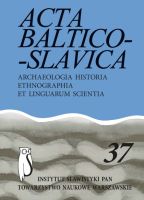O dublowaniu afiksów zaimkowych wyrażających nie- określoność (na materiale północnokresowym i ogólnopolskim)
On doubling pronominal affixes indicating indefiniteness (based on North Borderland and general Polish materials)
Author(s): Jolanta MędelskaSubject(s): Language and Literature Studies
Published by: Instytut Slawistyki Polskiej Akademii Nauk
Keywords: North Borderland Polish; indefinite pronouns; doubling affixes
Summary/Abstract: The present paper presents the results of a study of a number of pronouns, such as czyjkolwiekbądź ‘whose-ever’, jakikolwiekbądź ‘whichever’ and cośkolwiek ‘whatever’, jakiśkolwiek ‘whichever’, excerpted from various publications: books, brochures, textbooks, calendars etc., published in Polish in Kaunas (Republic of Lithuania) during the interwar period. These texts are then compared with publications printed in the whole of Poland, in an attempt to establish whether they belong to the so-called differential North Borderland regional expressions or are marginal forms used somewhere in Poland. In order to do this, the author has studied entries in Polish dictionaries, analysed quotation origins, researched the Polish digital libraries (digitalized Polish press from the interwar period) and cited testimonies known to her from North Borderland sources other than Kaunas interwar publications. The results of the study suggest that the studied structures are slightly more frequent in the North and East Borderlands as compared to the ethnic Poland, and in general they are rare and marginal in standard Polish. Both types of the analysed forms seem pleonastic: their subsequent pronominal affixes multiply their meanings and functions. The pleonastic nature of the ktokolwiekbądź ‘whoever’ type structure is obvious (-kolwiek and -bądź are synonyms, they indicate irrelevance of identification), and has been always condemned by prescriptivists. Ktokolwiekbądź and the affixes such as ktośkolwiek ‘whoever’ indicate indefiniteness, but each of them points to a different aspect of it: -ś denotes unknown identification, while -kolwiek conveys irrelevant identification. This kind of specific emphasis on indefiniteness, making it more precise, could have been useful at times. Nowadays, however, in many pronominal contexts, the -ś affix combines these two pieces of information: unknown identification and irrelevant identification, e.g. Daj to komuś ‘Give it to somebody [whoever – I don’t know to whom, and it does not matter who it is]’. The -śkolwiek component is no longer needed, and is gradually becoming extinct. In the North Borderlands, both types of the analysed forms seem to have some support in the foreign language systems to which the regional form of Polish used in this area has been exposed.
Journal: Acta Baltico Slavica
- Issue Year: 2013
- Issue No: 37
- Page Range: 515-526
- Page Count: 12
- Language: Polish

